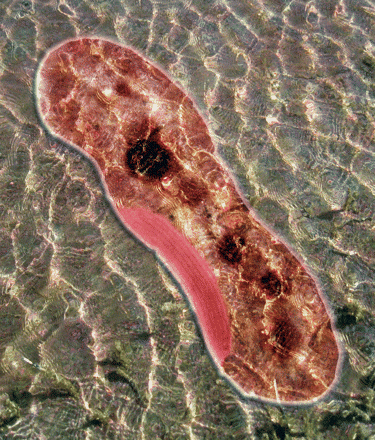Electron micrograph of Rhodopseudomonas palustris, gram-negative purple non-sulfur bacteria. This bacterium is able to switch between four different types of metabolism.
It grows in swine waste lagoons, earthworm droppings, marine coastal sediments and pond water. Although purple non-sulfur bacteria are normally photo-organotrophic, R. palustris is able to witch between
- photo-litotrophic,
- photo-organitrophic,
- chemo-litotrophic and
- chemo-organotrophic.
It is able produce enrgy by using
- light,
- inorganic compounds, or
- organic compounds.
It can acquire carbon from either
- carbon dioxide fixation or
- any organic compounds.
It is able
- to produce hydrogen;
- biodegrade several organic compounds and
- fix nitrogen.
It is able to live under a wide range of redoxpotention; both under
- atmospheric and
- anoxic conditions.
Bioengineers and genetic engineers hope new genes and new gene-level control mechanisms from this bacteria. It is one of the candidates of new biotechnologies too.
Its taxonomic position:
- Domain: Bacteria
- Phylum: Proteobacteria
- Class: Alpha Proteobacteria
- Order: Rhizobiales
- Family: Bradyrhizobiaceae
- Genus: Rhodopseudomonas
http://web.mst.edu/~microbio/BIO221_2010/R_palustris.html
http://microbewiki.kenyon.edu/index.php/Rhodopseudomonas
http://www.inocusol.com/RhodopseudomonasPalustris.htm
Pelletier DA, Harwood CS (2000) 2-Hydroxycyclohexanecarboxyl coenzyme A dehydrogenase, an enzyme characteristic of the anaerobic benzoate degradation pathway used by Rhodopseudomonas palustris. Journal of Bacteriology, 182(10):2753-60
Larimer FW, Chain P, Hauser L, Lamerdin J, Malfatti S, Do L, Land ML, Pelletier DA, Beatty JT, Lang AS, Tabita FR, Gibson JL, Hanson TE, Bobst C, Torres JL, Peres C, Harrison FH, Gibson J, Harwood C (2004) Complete genome sequence of the metabolically versatile photosynthetic bacterium Rhodopseudomonas palustris. Nat Biotechnol. 22(1):55-61.
